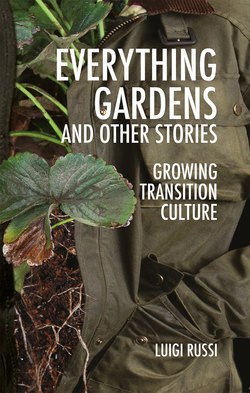Читать книгу Everything Gardens and Other Stories - UNIV PLYMOUTH - Страница 5
На сайте Литреса книга снята с продажи.
ОглавлениеRussi almost achieves the impossible in providing a rich and polyvalent description of an idea on the wing. Academics might recognise a kind of phenomenology in his approach, which is more akin to smelling and tasting, than weighing and measuring. Everything Gardens explores from within, Transition as a process of incubation or the deliberative unfolding of an alternative to consumer capitalism – a pattern language for a more place-generative, ecologically recursive form of local economy. Poetic and optimistic, Russi’s book adds ‘participant permaculture’ to the social science playbook. This is a new methodology that I am sure will become part of the repertoire.
Stephen Quilley, Associate Professor of Environmental and Social Innovation, University of Waterloo, Canada
What is Transition? That is the question that is at the core of this book. How do we go about Transition? How is Transition defined? At what point is Transition perceived as complete? The difficulty of these questions is so wonderfully managed in Everything Gardens, wherein we learn that, in a way that is perhaps similar to Theodor W. Adorno’s (or Herbert Marcuse’s) notion of non-identity, Transition is best understood only insofar as it is not reduced to an instrumental process that can be absolutely captured in some total concept or theory. [...] If ever there was a book that was so penetrative and that raises so many fascinating questions about the phenomenon of Transition, it is Everything Gardens. As a study of the utmost integrity, one can only hail this work by Russi as a significant and important achievement in the field of social science.
From the preface by R.C. Smith, Director, Heathwood Institute and Press
Will the Transition movement succeed in bringing about a transition towards a more sustainable, equitable and more resilient world? Luigi Russi doesn’t answer this question in this very important and readable new book, precisely because it is impossible to provide an answer. Rather than defining Transition and evaluating its chances of success, he delves right into the culture of Transition, providing us with rich stories of its daily ‘doings’ and ‘workings’ on the ground – in Totnes and elsewhere. He urges us to try to understand Transition not as something that can be dissected and critiqued from the distance but as an ongoing process that is full of contestations, surprises, changes and crises. Transition, he argues, is a true movement; it is everywhere but not necessarily nowhere. It is in the details of the social and material world, and what he has precisely done is give us snippets and glimpses of that Transition world. Everything Gardens is enlightening because it takes Transition seriously as a social, cultural and economic phenomenon that will change, potentially, all of our lives.
Steffen Böhm, Professor in Management and Sustainability, University of Essex and editor of Ecocultures: Blueprints for Sustainable Communities
